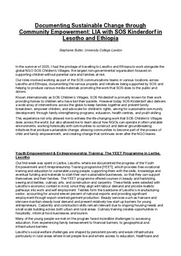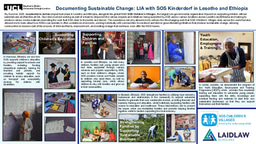Two months in: Reflections on My Oxford MBA Journey
It’s been 2 months since I started my Oxford MBA, and I’ve felt everything—some emotions I thought I had long outgrown, others completely new. I knew an MBA would be hectic, but "hectic" doesn’t really capture it. It’s like stepping into an entirely new world: a new country, new people, new routines. From figuring out laundry schedules and washing dishes to deciphering income statements and understanding cost management (which was totally unfamiliar to me!), it’s been an overwhelming whirlwind.
And to be honest, there have been moments where I’ve wondered, "How do I fit in here?" But deep down, I suspect everyone asks themselves that question sometimes.
When it all starts feeling like too much, I reach out to my dad. His intuitive wisdom and love for philosophy and psychology have always been my lifeline in such moments. I’d like to share some of the insights from our recent conversation because they’ve truly helped me make sense of this chaos—and I think they might resonate with anyone else who’s also navigating their own wild MBA journey/ or life in general.
Self-Referral vs. Object-Referral: Learning to Define Yourself from Within
One of the most impactful lessons I’ve learned is the distinction between self-referral and object-referral. In self-referral, your sense of worth, identity, and purpose come from within, shaped by your own values and perceptions—unclouded by external validation. It’s about creating an internal locus of control, where you guide your life by what matters to you.
Object-referral, on the other hand, is where you derive your self-worth from the opinions, expectations, and judgments of others. Think of society’s benchmarks: What’s considered cool, who’s succeeding the fastest, or what you’re “supposed” to do. Sound familiar? It certainly did to me, especially at a place like Oxford where ambition and excellence radiate from everyone around you.
Adler’s theory of inferiority and social comparison taught me this: the more we seek approval or measure ourselves by external yardsticks, the more we lose sight of our own unique value. I used to feel like I wasn’t ambitious enough compared to my peers—but once I started focusing on what I value, instead of what others expected, my own goals began to make a lot more sense. It was a game-changer.
Be Kind to Yourself and Embrace Your Own Journey
Oxford is full of brilliance. You hear about imposter syndrome all the time in places like this, but overcoming it isn’t just a one-time realization. It's about repetition. Every single day. Neuroscience tells us that the brain forms new neural pathways through spaced repetition, so it’s crucial to keep reminding yourself: You are good enough.
For some, Oxford feels as natural as breathing. For others, the UK is home, or business concepts are second nature. For me, though, this was a leap. I’m a girl from a middle-class family in Bihar who studied history—and somehow, I made it to Oxford’s MBA program on a full scholarship. It feels strange to say, but reminding myself of this, reminding myself of my journey, helps me appreciate it all. It’s not self-indulgent; it’s a way to honor where I’ve come from and the growth I’m working towards. You need to accept where you are before you can really move forward.
You Can Change How You Feel by Changing How You Think
One of the most empowering lessons I’ve learned is that how you think about something directly shapes how you feel about it. Our thoughts are shaped by experiences, memories, and conditioning—they create the lens through which we see the world. But here’s the powerful part: that lens isn’t fixed. We can change it.
It’s like changing your glasses. If the world looks dull or intimidating, you can switch out those lenses for a brighter, more empowering perspective. This is where neuroplasticity comes in. Our brains have the ability to form new neural connections, which means with conscious practice, we can actually rewire the way we think—and feel. Over time, those new patterns of thinking become your new reality.
So when MBA tasks feel overwhelming, or I start to compare myself to others, I remind myself that I have the power to tweak my thinking. Maybe I won’t feel confident right away, but with practice, I’ll shift those emotions and build resilience.
Takeaways for Anyone on This Journey (or Planning to Be):
- Define your own success. Create an internal compass—your values are what matter, not external validation.
- Be kind to yourself. Growth comes when you accept and honor your own unique journey.
- Remember that you can always reframe your mindset. Changing your thoughts will eventually change your feelings—and your experience.
For those embarking on their own MBA or similar path, I hope this helps in some way. This journey is personal, unique, and full of lessons we all need to figure out along the way.





Please sign in
If you are a registered user on Laidlaw Scholars Network, please sign in
Lovely article Harsha! :)
Thank you so much for sharing these wisdoms, Harsha! It's so difficult to remember yourself, your values and your why when so many external factors come into play, especially when you are in a rigorous, non-stop environment. This is such an insightful reminder that it's important to keep yourself at the centre and continuously come back to what you want and need from life.